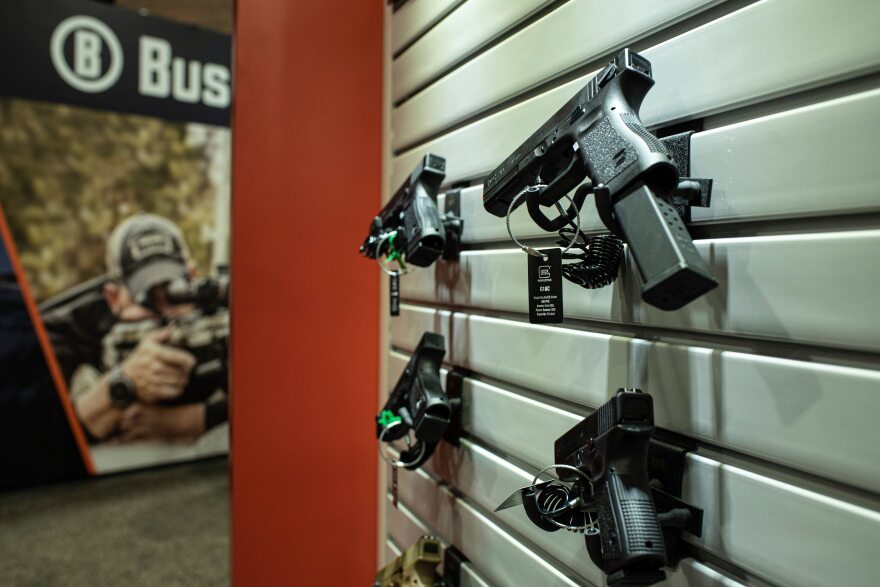A firearms industry trade and lobbying organization secretly built a database containing the personal information of millions of gun owners and used the data to reach gun rights supporters with political ads dating back to the 2000 elections, according to a new lawsuit.
The suit against the National Shooting Sports Foundation, based in Shelton, Connecticut, alleges the organization obtained the data from major gun manufacturers, whose customers never agreed to share their personal information for political purposes. The suit filed by two gun owners alleges “unjust enrichment” — that the NSSF benefited from using gun owners' information without paying for it.
The NSSF, whose members include thousands of gun manufacturers, distributors and retail shops, did not respond to an email from The Associated Press seeking comment Monday. The organization has said that there was nothing illegal or improper about its data collection.
The lawsuit, filed in Connecticut on Sept. 22, seeks class-action status on behalf of gun owners nationwide. It seeks damages in excess of $5 million but does not provide a specific dollar amount.
The plaintiffs are gun owners Daniel Cocanour, of Oklahoma, and Dale Rimkus, of Illinois, who provided their personal information to gun makers when they filled out warranty cards after buying firearms, the lawsuit says. The cards are used by consumers to obtain rebates and repair or replace their firearms.
The lawsuit mirrors reporting by ProPublica on the NSSF's use of gun owners' information for political purposes.
The NSSF began compiling its database in 1999 using warranty card information from manufacturers in the wake of the shooting at Columbine High School in Colorado that killed 12 students and a teacher, as gun companies sought to defend their industry against legal action and protect their image, the lawsuit says.
The cards provided a wealth of information about firearms buyers, including contact information, gender, age, income, interests, what vehicles they own and why they bought a gun, according to the lawsuit.
“For decades, NSSF violated the right of firearms purchasers to know who receives their personal information and to control how that information is used," said Ben Gould, a Seattle-based lawyer for the plaintiffs.
Lawsuit says Cabela's provided customer data
Before the 2000 election, outdoor goods and gun seller Cabela's shared information on 356,000 customers with a group created by the NSSF that put the data into the database, despite Cabela's privacy policies telling its customers that their information would only be shared with “reputable companies” to keep them informed of “other outdoor products and manufactures," the lawsuit says.
Using the Cabela's information and data bought from a broker, the NSSF group mailed political ads to 2.5 million people, according to the lawsuit.
Bass Pro Shops, which acquired Cabela's in 2017, said in a statement that it could find no records or anyone with knowledge about Cabela's violating customers' privacy.
“Safeguarding our customers’ privacy is something we take very seriously, and we can state unequivocally that Bass Pro Shops has never sold or made available our customers’ personal information to any organization for partisan political purposes,” the company said.
Database grew to include millions of records
By May 2001, the database contained 3.4 million records, including 523,000 from warranty cards and 2.9 million from voter and hunting license lists, the suit says.
Less than a year later, the database — called “Data Hunter” — had grown to 5.5 million records, with the NSSF revealing in an internal document that several firearms manufacturers including Glock, Smith & Wesson, Marlin Firearms and Savage Arms were contributing customer data, the lawsuit says. Those companies did not immediately respond to emails seeking comment Monday.
The NSSF claimed in a public report that its advertising using the database was a “critical component” of Republican George W. Bush’s narrow presidential victory in 2000, the lawsuit says. The NSSF used the database in similar political advertising efforts in subsequent elections, the lawsuit claims. In 2016, the group hired the Cambridge Analytica consulting firm to use the database to mobilize gun rights supporters in swing states, according to the lawsuit.
Cambridge Analytica later folded amid revelations that it paid a Facebook app developer for access to the personal information of 87 million Facebook users.
Justin Wagner, senior director of investigations for Everytown for Gun Safety, an anti-gun violence group, said the lawsuit makes it appear that the NSSF was amassing data on gun owners, while at the same time warning that such databases could be used by gun control supporters for mass firearm confiscation.
“We look forward to seeing the NSSF face accountability as the truth about this breach of trust comes to light in the courts," he said.





